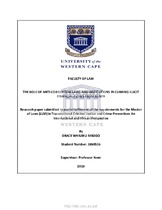The role of anti-corruption laws and institutions in curbing illicit financial flows from Kenya study
Abstract
The concept of the illicit movement of money aimed at concealing illegal activities and evading
taxes is not new. However, the global community first used the term “illicit financial flows”
(IFFs) in the 1990s and originally associated it with capital flight. The globalisation of financial
markets and the increasing ease with which individuals and companies transact across borders
have led to a substantial increase in IFFs. Despite their growing economic and political
significance, academics and international institutions are yet to formulate an agreed definition
of IFFs. One of the common definitions is that of Global Financial Integrity (GFI), which
describes IFFs as the illegal movement of illegal or legal money meant for an illegal purpose.
The Report of the High Level Panel (HLP) on IFFs from Africa estimates that the
continent loses more than US$50 billion annually through IFFs. The HLP Report notes that
abusive commercial practices, transnational criminal activities and corruption are the main
causes of IFFs in Africa. It estimates that commercial activities account for 65 per cent of IFFs,
criminal activities for 30 per cent and corruption for around 5 per cent. Kenya has lost
substantial amounts of money to IFFs. In the period 2002-2006, the country lost an estimated
US$686 million annually to IFFs.

